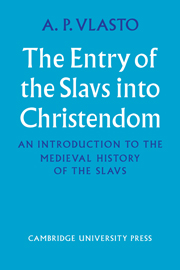Book contents
Summary
Khazars and Varangians
Kiev owed its early importance to its geographical position. Situated on an easily defensible bluff overlooking the River Dnepr, on the boundary between the forest upriver and the parkland and open steppe to the south, it was destined to become a centre of communications and commerce. Here the forest-dwellers could exchange their products for those of the civilised world, brought up from the Black Sea coast; here East and West could meet at an easy crossing of the great river.
It is probable that much of the West Ukraine, including the Kiev area, had been part of the region within which the Slav peoples originally developed. Products of the Roman Empire at the time of its widest economic radiation reached this country via the many rivers falling into the Black Sea. After the withdrawal of the Romans from Dacia in A.D. 271 the chief middlemen were the Goths—both Visigoths in modern Romania and those Ostrogoths who had established a loose empire in Southern Russia and dominated at least a part of the Eastern Slavs. The time of the Gothic Empire also saw the beginning of a great northward movement of the eastern Slavs up the River Dnepr and most of its tributaries—a colonisation of the forest zone by absorption or eviction of the Baltic and Finnic tribes in their path—by which the Dnepr became the main artery of their world. From that time on the importance of a political and economic centre somewhere in the Kiev region was assured.
- Type
- Chapter
- Information
- The Entry of the Slavs into ChristendomAn Introduction to the Medieval History of the Slavs, pp. 236 - 295Publisher: Cambridge University PressPrint publication year: 1970



